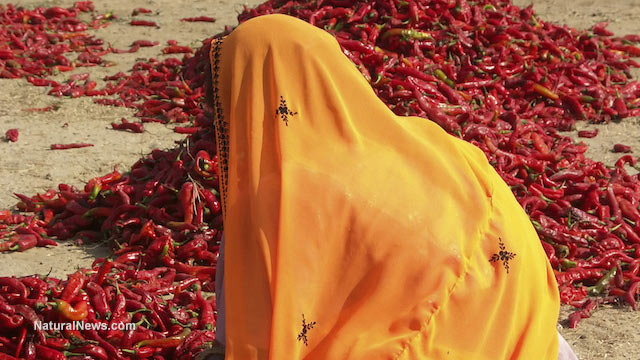Doctors link mass suicides, schizophrenic episodes among farmers to pesticide exposure
Sunday, May 08, 2016 by: Julie Wilson staff writer
Tags: GMO farmers, suicides, chemical pesticides

(NaturalNews) Previous reports have linked mass suicides among farmers in India to mounting debt and crop failures as a result of GMO crops, particularly cotton, as it was forcibly converted to patented, transgenic varieties owned by large agrochemical companies. But now we're learning that pesticide exposure may be to blame for a new wave of suicides among farmers in India.
Some 80 farmers in the village of Badi committed suicide between January and March of this year, according to the Times of India. Home to more than 2,500, Badi village (Madhya Pradesh) has had more than 350 suicides over the last two decades, affecting nearly every family in the village.
"There are 320 families in our village and at least one person from each has killed himself or herself," said Rajendra Sisodiya, a newly elected sarpanch or political figure in Badi. Sisodiya moved into the position after the previous sarpanch, his cousin, hung himself from a tree outside his home. Sisodiya's mother and brother had also committed suicide.
Are pesticides causing mental illness among Indian farmers?
While the epidemic likely has several contributing factors, excessive pesticide exposure and financial stress are being singled out as two major contributors. A psychiatrist based in Indore, the largest city of the Indian state of Madhya Pradesh, suspects that the suicides are related to depression and schizophrenic episodes among villagers caused by pesticides."Depression isn't something people here are easily able to relate to or identify. When they are unable to find any reason, they associate it with locally explainable phe nomenon [sic] like demonic presence," said Dr. Srikanth Reddy.
The psychiatrist's assertion is based on prior research linking depression and suicide to agricultural chemical use. "Apart from financial distress, there could be other causes for this depression," said Reddy.
Farming chemicals linked to suicides in China
"In a study some years ago in China, where a large number of farmers in a particular area were committing suicide, it was found that insecticides used there contained organophosphate, which is highly toxic and causes depressive mental conditions. Suicides in Badi and in Khargone at large, therefore, need to be probed."Many Indian farmers rely entirely on the success of cotton. When the crops fail, growers are sent spiraling into financial distress, feeling as if they have no recourse. The wave of suicides in Badi village almost seems contagious, as villagers lose more hope with each death.
"This is a very grave situation and we need to act fast. The villagers lack confidence and motivation and it's very important to counsel them," said Ashok Verma, who formed a committee to investigate the mass suicides.
Agrochemical companies take advantage of Indian farmers
As is the case in many countries, a social stigma is attached to mental illness, meaning sufferers are often reluctant to get help, turning instead to ineffective medicines rather than hospitals.Since 1995, some 300,000 farmers in India have committed suicide, Natural News reported. India's National Crime Records Bureau stated that the suicides were a result of "economic failure, poverty and bankruptcy caused by GMO adoption."
The numbers are likely far higher if one were to include data from before the year 1995.
"As explained in a thorough report by philosopher, physicist and environmental activist Dr. Vandana Shiva, GMO crop technologies are a Trojan Horse that multinational corporations are using to seize control of the global food supply.
"With false promises of increased yields and lower costs, corporations like Monsanto have swooped in and locked Indian farmers into contractual agreements that make them dependent on a centralized agriculture system that, in many cases, ends up bankrupting them."
Sources:
TimesOfIndia.IndiaTimes.com
NaturalNews.com
Science.NaturalNews.com
GMO farmers at FETCH.news
Get independent news alerts on natural cures, food lab tests, cannabis medicine, science, robotics, drones, privacy and more.
Take Action: Support Natural News by linking to this article from your website
Permalink to this article:
Embed article link: (copy HTML code below):
Reprinting this article:
Non-commercial use OK, cite NaturalNews.com with clickable link.
Follow Natural News on Facebook, Twitter, Google Plus, and Pinterest
- Newly released JFK files reveal Pentagon's role in creating Lyme disease and covid in the same lab
- Discovery of vast underground city beneath Giza pyramids challenges human history
- Black cumin seed oil emerges as a powerful ally against breast cancer and chronic inflammation
- Sugar-free deception: Artificial sweeteners hijack hunger signals, fuel obesity epidemic, study warns
- Kiss Your Genetic Privacy Good-Bye! 23andMe Gets Green Light to Sell Your Intimate Genetic Details to Anyone They Want
- Aluminum pollution: A silent threat to human health
- Dr. Suzanne Humphries makes bombshell appearance on Joe Rogan podcast, exposing vaccine industry deception back to POLIOMYELITIS
- Is the vaccine-autism debate reopening? Washington Post sparks controversy with preemptive hit piece on David Geier
- Sweden's migrant crisis deepens as failed green energy venture leaves thousands jobless, exposes systemic collapse
- The mighty Eggplant: An underrated superfood with ancient roots
- A handful of pecans a day could keep heart disease at bay, study finds
- Analysis: The coming economic collapse, a mass uprising and Trump's three secret weapons to halt the growing revolt
- The great crypto power struggle: How technocrats and governments are reshaping global finance
- Challenging the status quo: “America Fooled” by Timothy Scott exposes the myths about antidepressants
- RFK Jr. slashes HHS bureaucracy, saves taxpayers $1.8B while refocusing on chronic disease epidemic
- AI breakthrough slashes celiac disease diagnosis time from months to minutes
- HIGH-FAT FOOD DEPRESSION: Scientists discover why obesity takes away the pleasure of eating
- Understanding the difference: “Food Allergies and Food Intolerance” by Dr. Jonathan Brostoff and Linda Gamlin
- Newly released JFK files reveal Pentagon's role in creating Lyme disease and covid in the same lab
- Analysis: The coming economic collapse, a mass uprising and Trump's three secret weapons to halt the growing revolt
- Trump nominates VACCINE ZEALOT Susan Monarez to lead the CDC, sidelining RFK Jr.'s reform efforts
- Trump's greatest betrayal so far: Accelerating Middle East wars, silencing dissent, and serving Zionist masters
- Dr. Mike Yeadon releases 15-minute testimony - WATCH - about genocidal intent of COVID “vaccines”
- Festive flavors: The sweet history, nutritional profile and health benefits of pecan pie
- Elon Musk: Aliens could be here on Earth RIGHT NOW
- Big Pharma's $8 Billion bribery scheme exposed: how doctors are pushed to prescribe junk science, not heal
- 5 Simple steps to boost your brainpower: How to strengthen executive function in a distracted world
- Trump reverses course on Gaza plan, says “nobody is expelling Palestinians”
- A lack of integrity in Academia: Harvard professor found GUILTY of fraudulent research to promote CRT theory
- Reclaim your health: How midlife exercise reverses years of inactivity
- Survival 101: Effective EMF blocking techniques
- Florida takes a stand: DeSantis proposes permanent ban on mRNA vaccine mandates
- Sugarcane extract superior to cholesterol-lowering drugs?
- California's social media censorship law struck down: A victory for free speech or a threat to online safety?
- OpenAI whistleblower who dissented against how the company trained ChatGPT found dead
- EPA advisor admits the agency is funneling billions to climate groups ahead of Trump’s return to White House
- EPA advisor admits the agency is funneling billions to climate groups ahead of Trump’s return to White House
- Newly released JFK files reveal Pentagon's role in creating Lyme disease and covid in the same lab
- California's social media censorship law struck down: A victory for free speech or a threat to online safety?
- Dr. Mike Yeadon releases 15-minute testimony - WATCH - about genocidal intent of COVID “vaccines”
- The Health Ranger releases “Vaccine Zombie” song and music video, using AI-animated zombies for the music video
- The pandemic as a tool for INDOCTRINATION: Understanding “The Indoctrinated Brain” by Dr. Michael Nehls
- Florida takes a stand: DeSantis proposes permanent ban on mRNA vaccine mandates
- “Why we influenced the 2020 elections”: Facebook files reveal the coordinated effort to bury the Hunter Biden laptop story
- Mike Adams releases country western hit single: Goin’ Back in Time is Comin’ Home
- Mike Adams releases music poetry sensation: A Child of God
- Unpacking the Lies That We’ve Been Fed – new song and music video released by Mike Adams, the Health Ranger
- Michigan sheriff announces criminal investigation into 2020 election crimes, Dominion Voting Systems
- Migrants are taking advantage of recent hurricanes to scam residents and loot their homes
- House Intelligence Committee calls for the ARREST and PROSECUTION of Dr. Anthony Fauci
- RFK Jr. clears key hurdle: Sen. Susan Collins backs controversial HHS nominee, signaling a new era for health policy
- Rep. Nancy Mace introduces bill to ban biological males from female facilities on federal property
- Peter Rost exposes Big Pharma corruption in his book “The Whistleblower: Confessions of a Healthcare Hitman”
- Mike Adams releases new song and music video: Nothing More Disgusting Than a Globalist
- Red Cross issues warning to stop blood plasma donations from vaccinated people
- Scientists confirm: GENIUS brain function can be spontaneously unleashed in humans without any apparent cause
- EPA advisor admits the agency is funneling billions to climate groups ahead of Trump’s return to White House
- HYSSOP: What research reveals about the health benefits of this ancient holy herb
- Two containers with completed ballots fall out of truck in Florida
- Fully vaccinated about to see “tsunami” of illness and death, warns virologist
- Global leaders unite to clamp down on “misinformation” with UN-backed Cascais Declaration
- BREAKING: 2025 NDAA authorizes mandatory military draft of WOMEN across America… as Pentagon pursues global NUCLEAR war with both Russia and China at the same time
- Michael Yon warns of a ZIONIST TAKEOVER in Trump’s second administration
- BOMBSHELL: DNA testing kits are a SCAM to develop ethnic-specific bioweapons
- Ozempic and Wegovy weight loss drugs are injectable LIZARD VENOM PEPTIDES that may unleash a devastating wave of organ failure… side effects align with symptoms of SNAKE BITES
- Israeli soldiers accused of even more torture and abuse in the West Bank
- These 13 countries just signed an agreement to engineer a global FAMINE by destroying food supply
- NASA admits that climate change occurs because of changes in Earth’s solar orbit, and NOT because of SUVs and fossil fuels
- RFK Jr. clears key hurdle: Sen. Susan Collins backs controversial HHS nominee, signaling a new era for health policy
- Sermon 30: How Jesus reveals Caesar’s FAKE CURRENCY and FALSE AUTHORITY
- Coriander seeds: Ancient medicine backed by modern science
- Arizona officials claim Maricopa County needs 10-13 days to tabulate results of the election
Science News & Studies
Medicine News and Information
Food News & Studies
Health News & Studies
Herbs News & Information
Pollution News & Studies
Cancer News & Studies
Climate News & Studies
Survival News & Information
Gear News & Information
News covering technology, stocks, hackers, and more



"Big Tech and mainstream media are constantly trying to silence the independent voices that dare to bring you the truth about toxic food ingredients, dangerous medications and the failed, fraudulent science of the profit-driven medical establishment.
Email is one of the best ways to make sure you stay informed, without the censorship of the tech giants (Google, Apple, Facebook, Twitter, YouTube, etc.). Stay informed and you'll even likely learn information that may help save your own life."
–The Health Ranger, Mike Adams












































